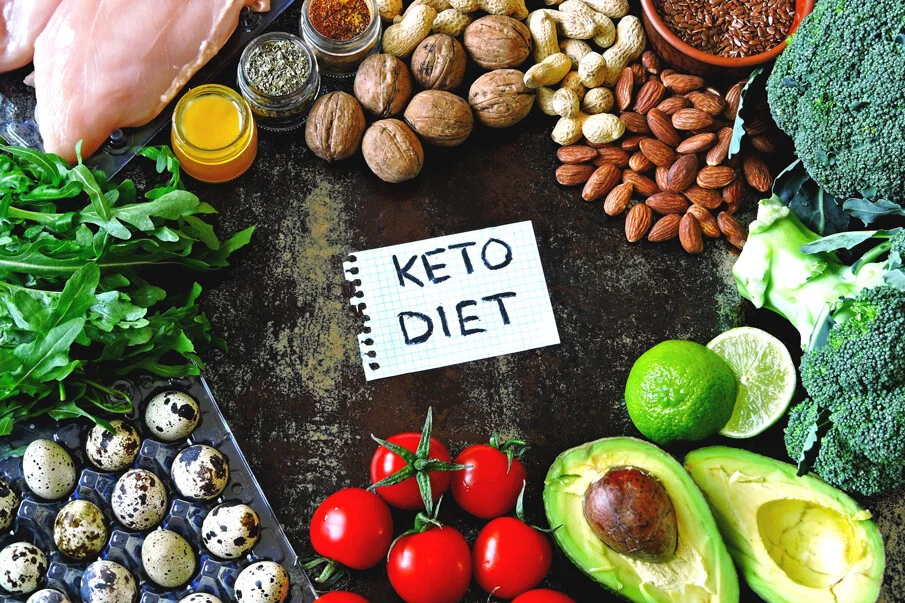
KETOGENIC DIET: WHAT ARE THE REAL BENEFITS OF A KETOGENIC DIET?
Table of contents
1. WHAT IS THE KETOGENIC DIET?
The ketogenic diet is a variant of the low-carb diet - a diet that focuses on a reduced intake of carbohydrates. In fact, the ketogenic diet is the strictest form of the low-carb diet: the aim is to consume less than 20 grams of carbohydrates per day. The name of the ketogenic diet is derived from the term ketosis. Ketosis is a special metabolic state to which the body is to be led with the help of the diet.
2. HOW DOES A KETOGENIC DIET WORK?
Ketosis occurs when the body no longer generates energy from carbohydrates, but from fat. In the ketogenic state, the liver forms keto bodies from coenzymes. These keto bodies - which are the acids acetoacetate, acetone and beta-hydroxybutyric acid - serve as the most important source of energy instead of carbohydrates. Depending on the strictness of the ketogenic diet, it takes a few days to two weeks for the body to enter ketosis.
The German Nutrition Society (DGE) recommends that 50 percent of the diet should consist of carbohydrates, 30 percent of fat and 20 percent of protein. A keto diet, on the other hand, consists of around 80 percent fat, 15 percent protein and only five percent carbohydrates. By comparison, the low carb diet consists of 50 percent fat, 25 percent protein and 25 percent carbohydrates.
3. WHY IS THE KETOGENIC DIET USED?
One of the most important intentions of the ketogenic diet is therapeutic: Otto Warburg, who later won the Nobel Prize, discovered in 1924 that malignant tumors need glucose derived from carbohydrates in order to spread. Conversely, the ketogenic diet assumes that cancer cells are deprived of the basis for their existence if the proportion of carbohydrates in the diet is reduced to a minimum.
This is why the ketogenic diet is primarily known as a cancer diet. However, it is also used to lose weight. This is based on the assumption that it is not fats that make you fat, but carbohydrates. In addition, followers of the ketogenic diet believe that ketone bodies are a better source of energy than carbohydrates and thus lead to better health and well-being.
4. WHAT ARE KETO FOODS?
Here you can see the ketogenic foods in order of importance in the ketogenic food pyramid:
Vegetables: Low-carb vegetables such as green salads, spinach, cucumber, pak choi, Brussels sprouts, Chinese cabbage, kale, zucchini or leeks form the basis. Starchy vegetables such as sweet potatoes should be avoided.
Meat: Meat, poultry and fish follow directly after vegetables. All foods should be unprocessed. Beef, turkey, chicken, game meat, salmon, tuna, perch, cod, pikeperch or trout are suitable for the ketogenic diet. Seafood such as crab, prawns or mussels complement the diet.
Eggs: Chicken eggs also contain only a few carbohydrates and provide protein andvitaminssuch asvitamin A,vitamin Band vitamin K. They are therefore part of a ketogenic diet.
Dairy products: Whole milk, quark and cheese with a high fat content should be eaten in particular. They provide calcium and protein. However, they contain lactose, so they should only be eaten in moderation. In a vegetarian keto diet, dairy products are more important as a source of protein.
Nuts and seeds: Hazelnuts, almonds, walnuts, pistachios or sunflower seeds - nuts and seeds contain valuable fats. As they also contain carbohydrates, they should be consumed rather rarely.
Fruit and berries: Fruit holds fructose, i.e. sugar, and should therefore be used sparingly. Strawberries, currants, raspberries and blueberries are particularly suitable, as are avocados and olives.
5. ARE THERE ANY RISKS WITH A KETOGENIC DIET?
Many nutritionists are skeptical about the ketogenic diet. They see the danger of the body becoming over-acidified due to the massive formation of keto bodies and the accumulation of toxins that can burden the kidneys and liver. If the body enters a state of ketosis, this can lead to concentration problems and fatigue. Studies show that bad breath occurs in 30 percent of cases because the bile produces acetone. 33 percent of people on a ketone diet suffer from constipation and 28 percent from muscle cramps1.
People who have already followed a ketogenic diet often report that the body gets used to the state of ketosis and that they feel better after a short time. However, many nutrition experts see the danger of nutrient deficiencies and recommend a moderate low-carb diet for losing weight. The ketogenic diet makes sense for some metabolic diseases. However, it should only be followed under medical supervision. Ketoacidosis, i.e. hyperacidity of the blood, can be life-threatening in extreme cases.
6. WHAT SCIENCE SAYS ABOUT THE KETOGENIC DIET
Studies have shown that the ketogenic diet can lead to significant weight loss in the short term2. However, there is no evidence that the ketogenic diet has a positive effect on cancer. Rather, researchers point out that cancer cells are very adaptable and do not necessarily need carbohydrates to spread.
There are indications that the ketogenic diet can lead to organic problems in the long term. Cancer specialists recommend eating a balanced diet with all the important nutrients to strengthen the body and its defenses. Conversely, a healthy diet can reduce the risk factors for developing cancer. For example, organ fat in the abdominal region can promote cancer3.
Sources:
1 Study: Rhonda Ting et al, Ketogenic diet for weight loss, Link:https://www.ncbi.nlm.nih.gov/pmc/articles/PMC6371871/
2 Study: Joshi Shilpa et al, Ketogenic diets: Boon or bane?, Link:https://www.ncbi.nlm.nih.gov/pmc/articles/PMC6251269/3) Study: Anna Azvolinsky, Cancer Risk: The Fat Tissue-BMI-Obesity Connection, Link: https://academic.oup.com/jnci/article/106/4/dju100/2607285
3Study: Anna Azvolinsky, Cancer Risk: The Fat Tissue-BMI-Obesity Connection, Link:https://academic.oup.com/jnci/article/106/4/dju100/2607285
